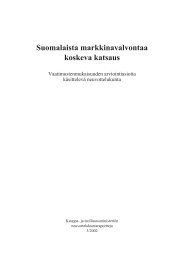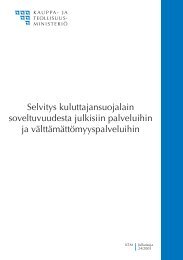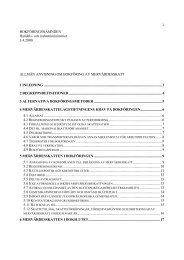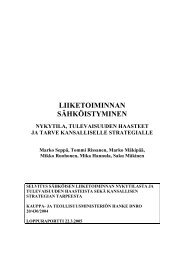Knowledge Intensive Services' Suppliers and Clients
Knowledge Intensive Services' Suppliers and Clients
Knowledge Intensive Services' Suppliers and Clients
You also want an ePaper? Increase the reach of your titles
YUMPU automatically turns print PDFs into web optimized ePapers that Google loves.
37<br />
narrower range of products will be produced, though there may in fact be a greater<br />
variety of differentiated products within this range.<br />
This trend back to core activities is expressed in the investment policy: the<br />
company invests in technologies <strong>and</strong> areas of knowledge in which it is (or wants to<br />
be) genuinely competent. This implies that individual activities are assessed, to<br />
establish whether they are core activities – or, if not, whether they should be<br />
dispensed with, or, if they provide necessary inputs to the firm, whether they can<br />
<strong>and</strong> should be subcontracted. Not all activities are ones which firms feel happy<br />
about subcontracting, <strong>and</strong> there have been lively discussions about the costs<br />
<strong>and</strong> benefits of outsourcing <strong>and</strong> facilities management in computer <strong>and</strong><br />
telecommunications functions. The concept of “strategic outsourcing” has been<br />
coined to describe the processes <strong>and</strong> decisions involved in contracting out<br />
activities, which include not only evaluating the role of the activities themselves,<br />
but also the reliability <strong>and</strong> relative cost of suppliers. The wide application of<br />
relatively new concepts such as strategic outsourcing <strong>and</strong> lean production is<br />
likely to contribute to a further subcontracting of non-core activities <strong>and</strong> the<br />
externalisation of services. Often this will result in the growth of specialised<br />
business services as organisations contracting-out activities to service firms.<br />
Sometimes these service ‘firms’ are actually self-employed individuals, indeed<br />
they may even be ex-employees who are made redundant <strong>and</strong> then taken on as<br />
subcontractors to carry out the same work – but with less overhead for the core<br />
company. 15 The “hollow corporation” is liable to be surrounded by service firms<br />
performing vital parts of its activity: the challenge is one of finding ways of<br />
ensuring that the same quality of input is maintained. 16<br />
An important reason for firms to seek to focus on the core is the desire for high<br />
quality production, as quality becomes a key issue in competition (recall Peneder’s<br />
conclusion that KIBS consumption was associated with higher quality output,<br />
discussed above). Outsourcing also gives rise to greater dem<strong>and</strong>s for certification<br />
of suppliers to quality st<strong>and</strong>ards, as “leaner” firms (<strong>and</strong> public authorities who are<br />
15 For example, a publishing firm may lay off its editorial staff, <strong>and</strong> then recommission them as<br />
self-employed editors to carry out the same task – Butterworth-Heinemann closed down an entire<br />
office building (in Guilford, UK) on using this strategy in the early 1990s, for example.<br />
16 Many commentators hail these developments as ones that will be multiplied as new technology<br />
allows more people to become ‘telecommuters’, working from remote homes or community offices<br />
for distant organisations. There are certainly moves in this direction, but whether they will develop<br />
on a large scale will depend in part upon whether ways can be found of empowering remote workers<br />
– especially if they are no longer actual employees who can be treated <strong>and</strong> made to feel like part of the<br />
‘family’ – with the sorts of social support that are common in traditional organisations.
















